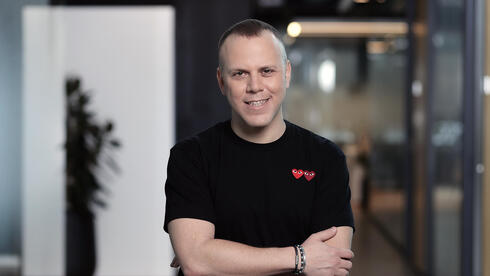
HR in the AI era
AI is “significantly shaping” operations at Sola Security
According to its CPO, AI is an integral part of Sola’s DNA. So while the company hasn’t experienced a dramatic “disruption” from the AI revolution, it has been steadily growing and adapting alongside it.
“We’ve been developing our entire People infrastructure with AI in mind, and are fortunate to recognize this early on given the nature of our product and the industry we’re in,” said Osnat Yarimi Magen, Chief People Officer at Sola Security. “Every team member is expected to do more with less with AI, and we make sure to provide employees with the AI tools they need to do just that.”
CTech’s "HR in the AI Era" series explores how the AI revolution is impacting the workforce across Israeli high-tech companies. In this series, we uncover the effects (both personal and professional) that this technology shift has had on Startup Nation.
The AI revolution is “influencing how we think about efficiency, workflows, and team growth,” Yarimi Magen continued. “In HR specifically, AI is becoming an integral part of how we approach tasks like onboarding, internal communications, and performance support.”
You can read the entire interview below.
Company name: Sola Security
Your name and title: Osnat Yarimi Magen, Chief People Officer
Names of founders and upper management: Guy Flechter (CEO and Co-Founder), Ron Peled (COO and Co-Founder), Dor Swissa (VP R&D), Leon Goldberg (CTO), Minnie Katzen Mayer (VP Marketing), Naama Halevi Davidov (CFO), Osnat Magen Yarimi (Chief People Officer), and Shlomi Lavi (VP Product)
Year of founding: 2024
Investment stage: Seed
Total investment to date: $30 Million
Field of activity: AI, Cyber
Number of employees: 45
Office location: Ramat Gan
Number of open positions: 2
On a scale of 1-10, how much does the AI revolution disrupt your company operation in general, and the HR department specifically?
7
AI is significantly shaping how we operate, especially as we’re building our company and HR infrastructure from the ground up. It’s influencing how we think about efficiency, workflows, and team growth. In HR specifically, AI is becoming an integral part of how we approach tasks like onboarding, internal communications, and performance support.
We’re not experiencing disruption in the traditional sense mainly because we’ve been working with AI from day one. Sola Security is an AI based tool so it’s an integral part of the company’s DNA. But we know this is an ongoing transformation which we’ll constantly adapt to and grow with.
What interesting AI tools do you and your staff use in employee management/recruitment?
The main tools we’re using are ChatGPT, Claude, and Juicebox.
In which roles or tasks within your company has AI already begun to replace human labor (if at all)?
Sola was founded a little over a year ago, and we’re still building it every day. We’ve been developing our entire People infrastructure with AI in mind, and are fortunate to recognize this early on given the nature of our product and the industry we’re in. So AI isn't replacing labour per se, but it is enhancing every single team.
Every team member is expected to do more with less with AI, and we make sure to provide employees with the AI tools they need to do just that. This also means we're hiring very selectively focusing primarily on identifying opportunities to increase growth, creativity and efficiency with our existing team.
What are the two major challenges you are coping with these days?
- Measuring and quantifying the impact of AI: As AI becomes embedded across all teams and departments, it's essential to measure its impact by understanding how employees are using these tools to drive growth, identifying any additional tools they may need, and determining which roles we still need to hire for within this AI-augmented framework.
- Balancing automation with the human touch: As we automate more tasks, especially in HR, it's critical to maintain a strong human element in areas like employee engagement, communication, and decision-making. Even when you use AI, we still want it to feel personal and familiar.
Have you experienced workforce-related challenges due to the war, and are you still feeling the impact of the security situation on your human resources?
We founded the company after the war began, and as we're fully based in Israel, the security situation is very much a part of our daily reality. Reserve duty is a recurring factor for some of our team members, and we’ve adapted to it as an ongoing aspect of working life here.
Have you made changes to your workforce following the increased use of AI tools, both in terms of headcount and internal shifts between departments?
We haven’t made any structural changes, but we have actively encouraged all team members to integrate AI tools into their daily workflows from day one.
How does the global market uncertainty affect your workforce, in terms of employee numbers or departmental reallocations? Are you scaling your workforce up or down in different regions around the world?
As a young company still in its early growth phase, we’re building our workforce with a strong emphasis on efficiency and scalability. Global market uncertainty reinforced our decision to hire selectively and focus on maximizing the impact of our existing team. Rather than scaling up rapidly, we’re prioritizing smart growth and leveraging AI to optimize internal processes and productivity.
Do you estimate that in 2025–2026 you will increase or decrease the number of personnel? Explain why.
We expect to gradually increase our headcount in 2025–2026 to support business growth, while maintaining the same level of selectiveness and strategic focus we apply today.














